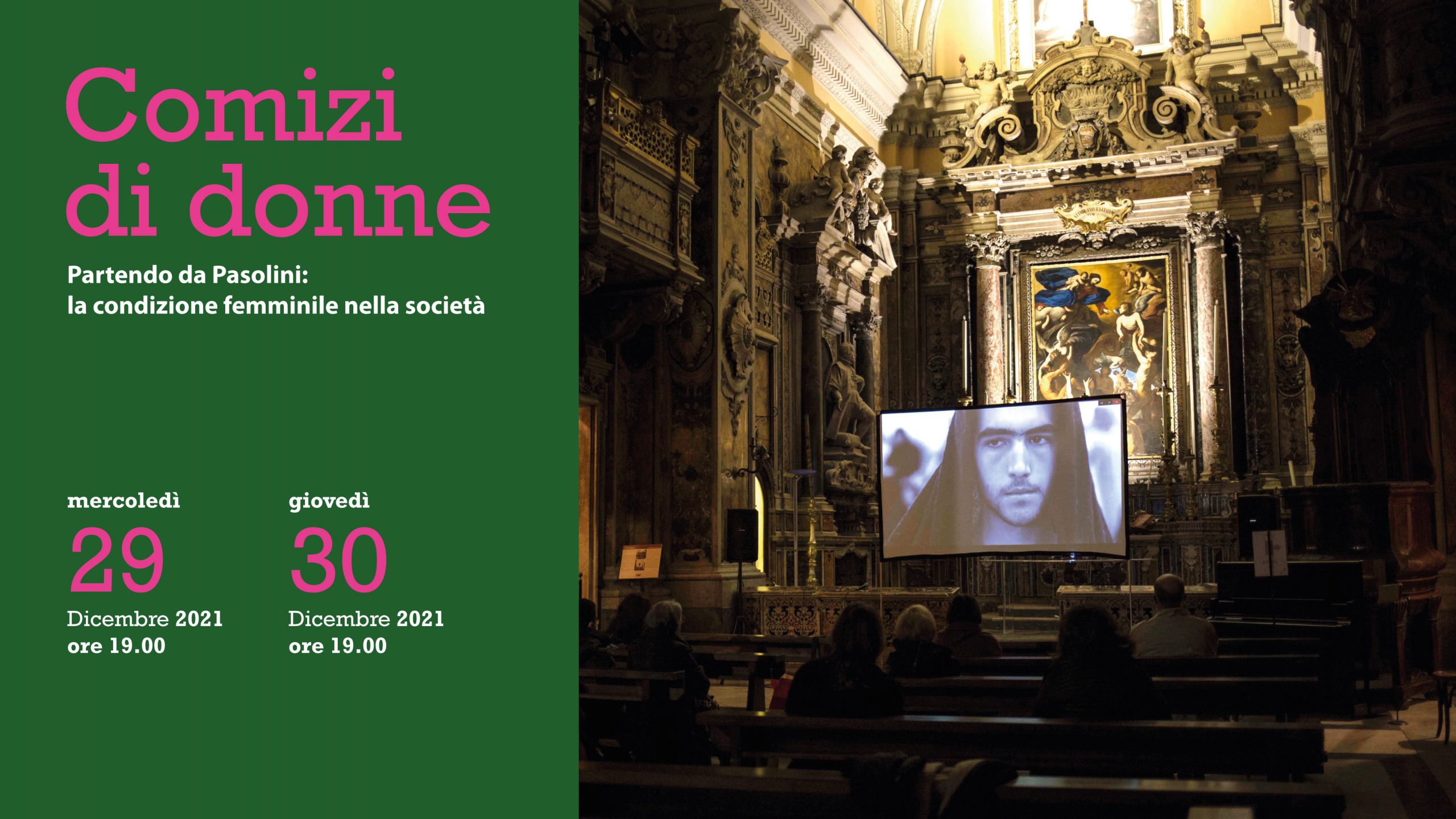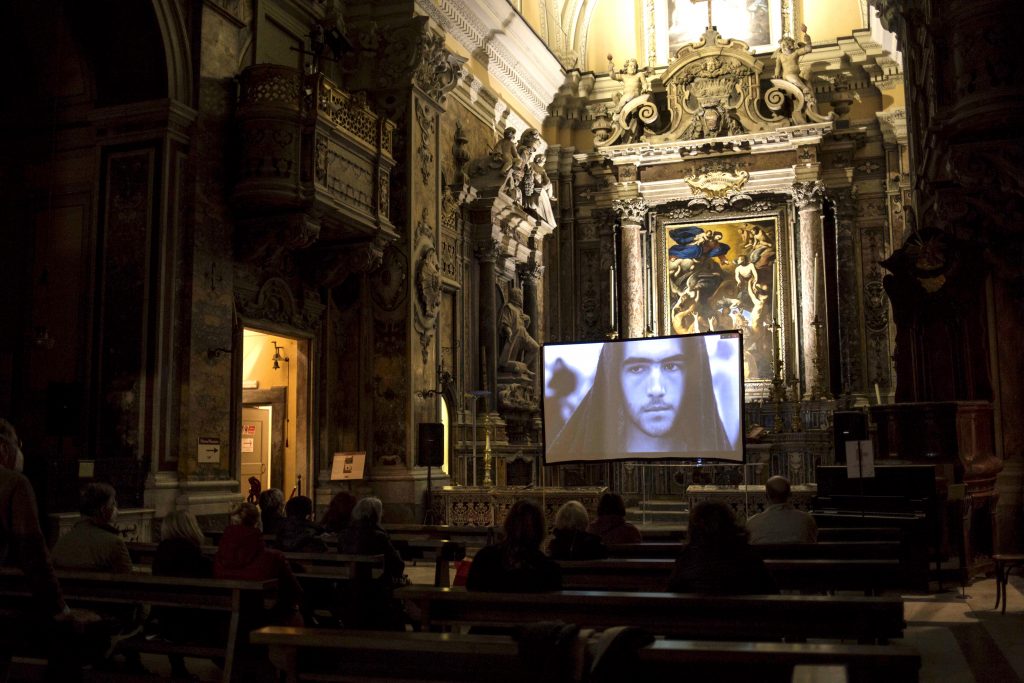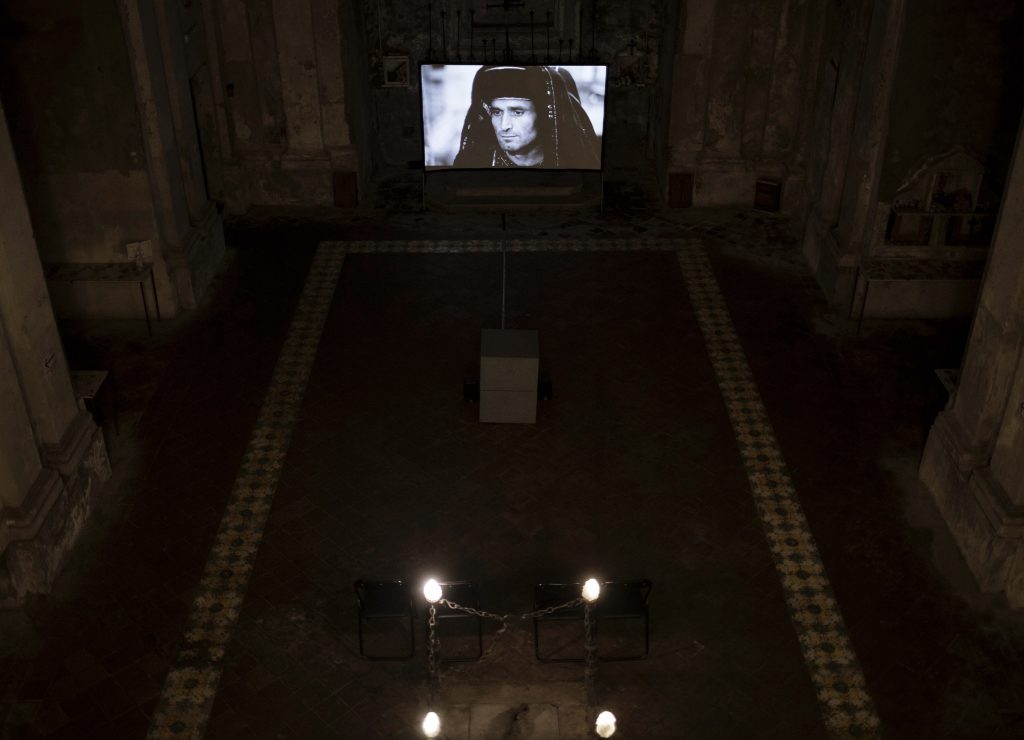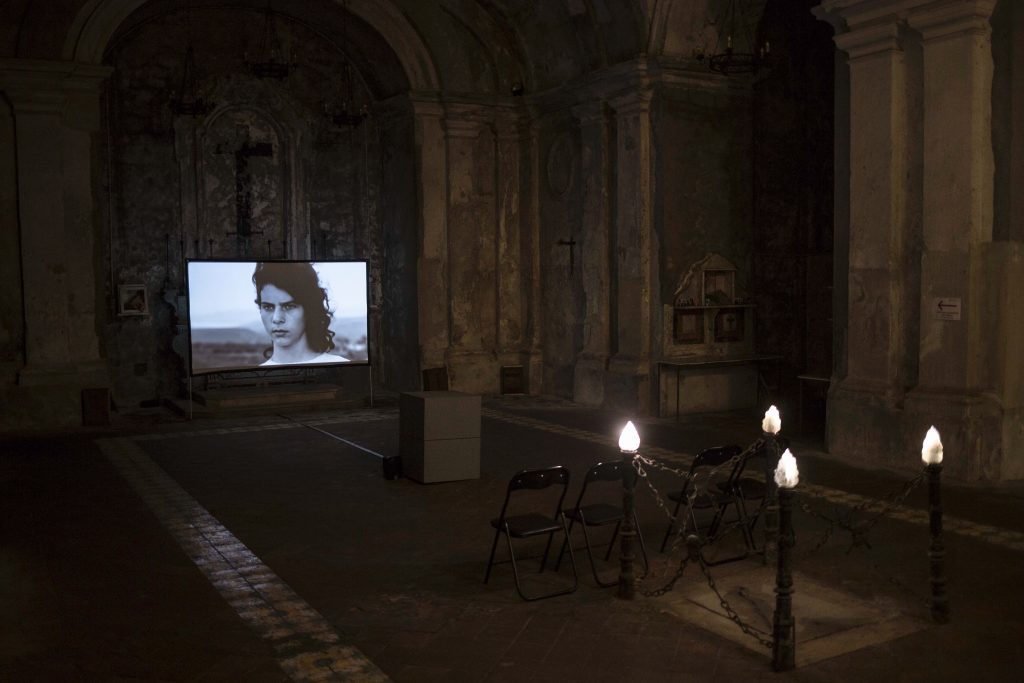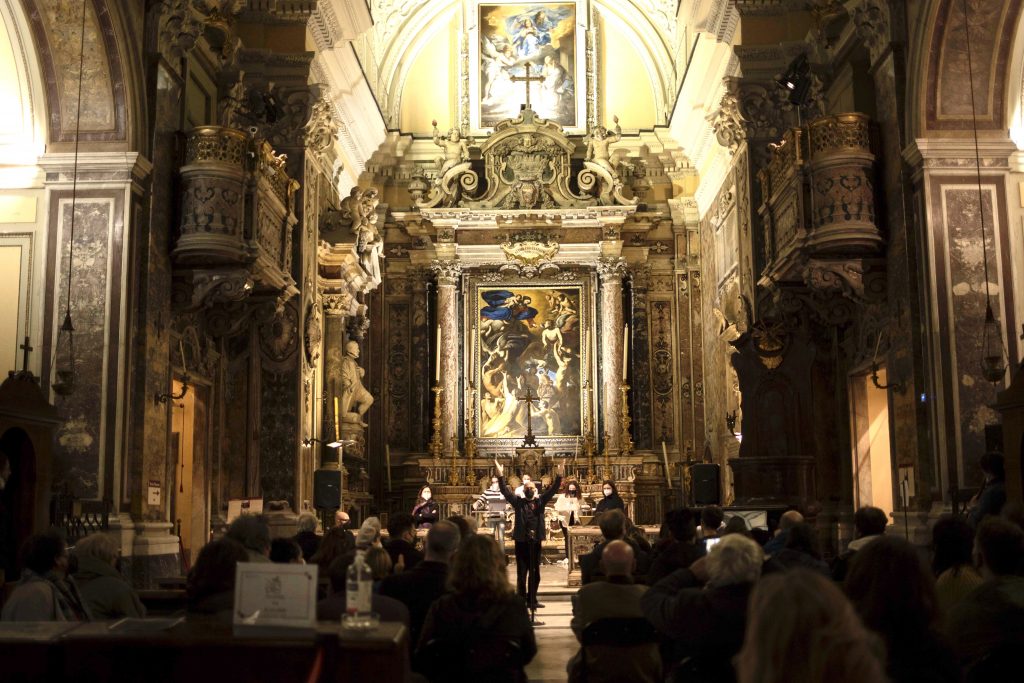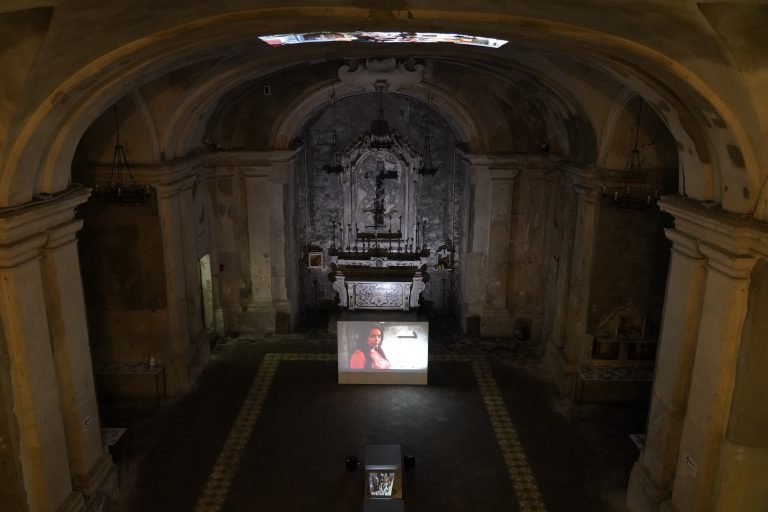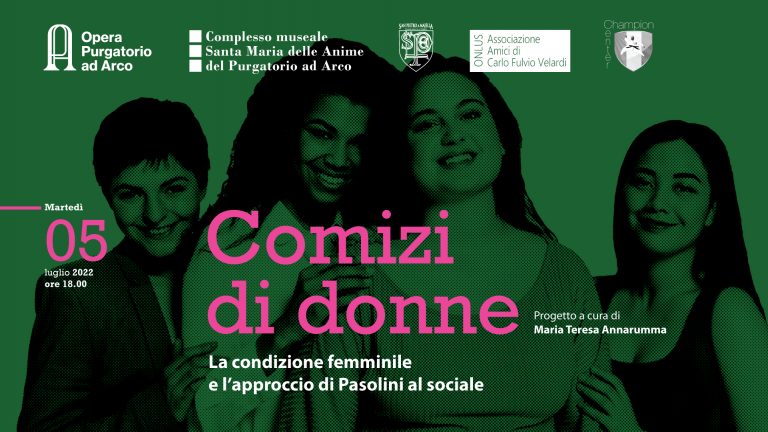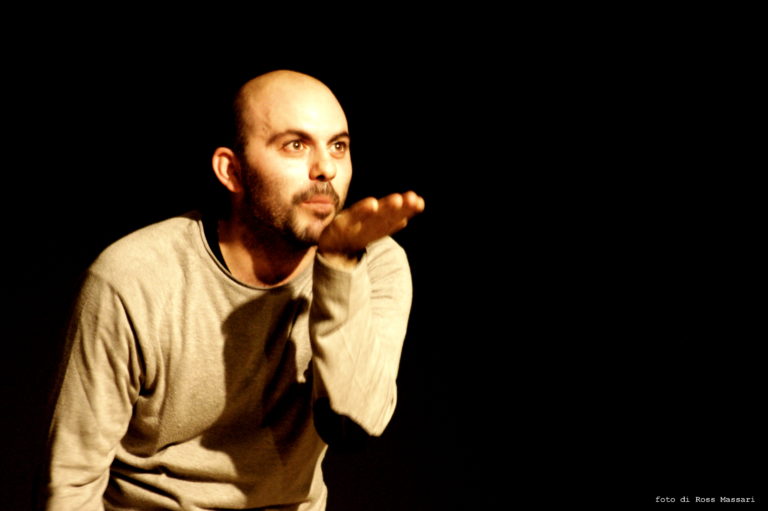
COMIZI DI DONNE
The female condition and the Pasolini’s approach to social issues
Opening 29th and 30th of December 2021
Project curated by Maria Teresa Annarumma
2022 will see the celebration of the 100th anniversary of Pier Paolo Pasolini’s birth. His work is the starting point of a six months project. The COMIZI DI DONNE will begin from an understanding of history that significantly relates to Pasolini’s ideas. It will come to look at contemporary life and to the female condition in Naples and in the world from a different perspective. It proposes a revolutionary consciousness that links women through history and argues for a new social contract (“social contract” refers to a concordance in society regarding the relative responsibilities and rights of its citizens) which may finally acknowledge the equity that has been for so long promised and for which so many have struggled: this is the “coming community” in the making of which we are a part.
The project takes place in the 2021/22 program of the Complesso Museale di Santa Maria del Purgatorio ad Arco in the third year of the pandemic. It will speak for an experience of the world that has been hidden in clear sight, a part of which many of us have known in our own lives, and for the possibility of a way forward.
Pier Paolo Pasolini has been incredibly influential in Italy most of all for its radical critique of the social and economic changes across Italian society between the ’60’s and late ’70’s: his fame is not uniform, as well as being motivated by sometimes contradictory reasons but what can be certainly said is that his work was constantly addressed to a social, collective awareness.
Novels, essays, articles, film, television participations, every tool was the right one for him if it was able to show how Italy was changing and how these changes were provoking a transformation of a cultural and social background, a world that had evolved through centuries and was fast being destroyed by liberalism. Possibly, the wide spread action of Pasolini and his seeming versatility across so many fields, moved the critics forward various researching paths which are still capable to create disagreements and several opponents, even until today so many years after his death, but I believe this has also had the side effect of leaving largely hidden and less considered an important characteristic of his work: the close and deep attention to the lives of people and Pasolini empathic attitude towards humankind.
This description of Pasolini, his work and life, to be a focus on his essential social and political choice based on his incessant research of what he believed to be the truth in the human being, and his belief that to see the true being he should have been focused on the hidden part of the society, the one which carries on the history, the deep history, but also the one which is left at the edge and most suffers under the weight (social and economic) of the consequences of the social change moved by liberalism.
What is consistent in Pasolini is really this Copernican revolution of the narration, who supposes to be the protagonist (the one who makes changes) is put apart than who witness the events is the protagonist. “The Gospel According to Matthew” (1964) is going to be our starting point to explain the path of our program 2021/22.
What is more a protagonist of history than Jesus? But, since the first scene, the Italian thinker shows a clear statement about the point of view which he meant to be central to the understanding for the history of the world: despite to focus on Christ he decided to make central to the narration what mattered for him, which is the effect that Jesus had over the people around him, and the way in which these witnesses shaped their lives and the world around them afterward.
To do that he makes this film a large use of close up of the people who were present but who were before seen only as background at the time of the Saint Matthew narration, making the attention on their reaction, the way in which they welcome the Word: people so often overlooked in the story – the crowd, the witnesses, the people who pass through the story, the people gathered around in the background of paintings, the “extras” in films of the story – but actually the ones who moved and spread their experiences, not only the disciples, but the others who
lived and were there. In his film Pasolini acknowledges and gives place to those who are to make the world, just as he believed that the history, he believed was being lost in Italy was made by the people. He spoke in his work to the passion, and sometimes rage, he felt in his belief that the people he brought to the foreground were the true voice of history, and of the present. In this he reflected dramatically the sense of a slow history informing the present that social historians like Braudel were opening at the time, and like them it led him to a politics and faith. The power of the film is in both the recognition of this deep history and of a moment of revolutionary change in which the forgotten witnesses are to be the protagonists.
This simple recognition made me think to the outcome of “Il Camabiamento Oltre il Visibile” that last summer showed us that who needs now to be under the light because invisible witness of the history but at the same time are the necessary architects of history are the women.
Looking to the history of women, it was impossible to escape the feeling that while the world has changed in so many ways, women’s struggle is still very much present and, in many ways, it is too similar to what women have lived in the past: how much of our society is based on women’s unpaid work? And how deeply embedded patriarchy is, as the strongest form of exploitation because still so widely socially accepted! Reading of the past of Naples (one the cultural capitals of Europe in the XVIII century) and listening to the stories of lives lived today in the center of Naples (still one of the major Italian cities) although it’s our familiar reality it never ceases to be shocking that so much of social life and economic production assumes the unpaid labour of women and significantly depends upon the limiting and denial of women’s economic, social and sexual freedom.
This world and Naples need the same kind of Copernican revolution made by Pasolini in his work and in his famous “Comizi d’Amore” (1965) when he thought that to build up a strong awareness of the world and of the history was necessary to cross out every form of authorship to let the people to become the author of the narration through their lives which are actually the real strength and protagonists of family, society and the lives of all of us.
In fact, if author like Elena Ferrante have had success with books in which is described a peripheral society (even if the meaning of what is peripheral is not so clear) where women fight fiercely in a morally and cultural violent world, the necessary dramatization of the narration if it’s helpful for the author leaves the women inside just an aura of real which inevitably dimmish the strength of the real.
What we need now is to shake the awareness also between women: like Eleonora Pimenthel Fonseca struggled in spreading unsuccessfully the values of equality and democracy, also now we live the same kind of drama about the condition of women, leaving to storytelling of the female condition to book like the one of Ferrante but keeping apart what instead is the daily struggles of endless story of female deprivation.
In fact, as it happens with the Republic of Naples in which the intellectuals who moved the revolution to build up a democratic and equal society were unable to spread through the populations the values of their emancipation at the same time, feminist movements have been
moving for the last 30 years form a fight for the civil rights to more an intellectual debate less effective in the daily problems of the women.
Our program will move from a first stage in which using, in Pasolini’s anniversary year, the film “The Gospel According to Matthew”, we will reverse the prospective in which to read the history through a video study of this film (giving a radically new attention and emphasis to what has been overlooked and misunderstood!). The new reading will be made as a work of art in itself and as an opening to the next step: the world of the women.
Next there will be a round table to move to a first step of this different narration, the world of women given voice, together with a sound installation by Marco Messina as an artwork and pivotal point from Pasolini’s hidden world to the hidden world of the present denied. The round table will describe the history and the field, and speak to the present – the female narration and tradition to move towards achieving the final stage:
The making and showing of the activist video “Comizi di Donne” in which the artist-protagonists will be the history of Neapolitan women. Carrying through the promise, long overlooked, that there was a premonition of in Pasolini’s work, and which was waiting for its true voice to be released: the testament of women. Their gospel.
In the meantime, a cycle of four concerts of electronic music made in collaboration with the Academy of music will be focus on the language and the way in which is translated in the protagonist of the Pasolini cinema.
Maria Teresa Annarumma


